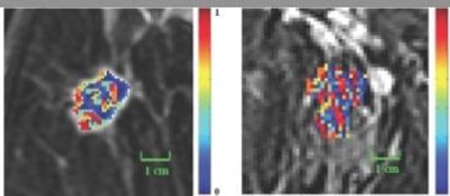Faster, Cheaper Test for Guiding Breast Cancer Treatment

Chemotherapy is a nonspecific way of killing off cancer cells with drugs that is often accompanied by many toxic side effects. About 70 percent of breast cancer patients are diagnosed with a tumor containing estrogen receptors (ER), which requires treatment with hormones but not necessarily chemotherapy. Whether a patient needs chemotherapy depends on the aggressiveness of the tumor, which is currently determined by an expensive laboratory test that requires tissue biopsy and time to ship and run the test. Researchers from Case Western Reserve University recently discover a new way to analyze magnetic resonance imaging (MRI) data to differentiate between aggressive and nonaggressive tumors. The new computer technique is able to correlate gene expression differences to changes in the texture patterns of MRI images. Such quantitative, dynamic texture changes are then used to determine the aggressiveness of the tumor. The researchers tested this approach on 96 ER-positive breast cancer patients and found that it predicted the requirement or not for chemotherapy with 85 percent accuracy. Further development of this noninvasive test has great potential to reduce breast cancer diagnostic time and cost to healthcare providers and patients.
Differences in dynamic textural pattern features are apparent between a patient with a low recurrence score, left, and a patient with a high recurrence score, right.
References
- Image Credit: Courtesy of Nature Scientific Reports Wan T, Bloch BN, Plecha P, et al. A radio-genomics approach for identifying high risk estrogen receptor-positive breast cancers on DCE-MRI: preliminary results in predicting OncotypeDX risk scores. Scientific Reports. 2016;6:21394 DOI: 10.1038/srep21394







